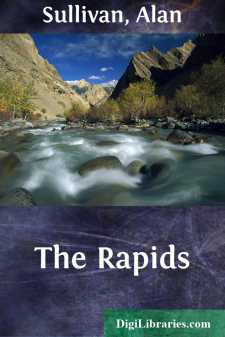Categories
- Antiques & Collectibles 13
- Architecture 36
- Art 48
- Bibles 22
- Biography & Autobiography 813
- Body, Mind & Spirit 142
- Business & Economics 28
- Children's Books 15
- Children's Fiction 12
- Computers 4
- Cooking 94
- Crafts & Hobbies 4
- Drama 346
- Education 46
- Family & Relationships 57
- Fiction 11828
- Games 19
- Gardening 17
- Health & Fitness 34
- History 1377
- House & Home 1
- Humor 147
- Juvenile Fiction 1873
- Juvenile Nonfiction 202
- Language Arts & Disciplines 88
- Law 16
- Literary Collections 686
- Literary Criticism 179
- Mathematics 13
- Medical 41
- Music 40
- Nature 179
- Non-Classifiable 1768
- Performing Arts 7
- Periodicals 1453
- Philosophy 64
- Photography 2
- Poetry 896
- Political Science 203
- Psychology 42
- Reference 154
- Religion 513
- Science 126
- Self-Help 84
- Social Science 81
- Sports & Recreation 34
- Study Aids 3
- Technology & Engineering 59
- Transportation 23
- Travel 463
- True Crime 29
The Rapids
by: Alan Sullivan
Categories:
Description:
Excerpt
THE RAPIDS
I.—CLARK DISCOVERS ARCADIA
Amongst the few who knew Robert Fisher Clark at all well, for there were not many of them, there was no question as to his beliefs. It was too obvious that his primary faith was in himself. Nor is it known whether, at any time, he gave any thought or study to the character of those with whom, in the course of his remarkably active life, he came into association. Always it appeared that there was laid upon him the responsibility of doing things which did not occur to the ordinary man, and he went about them with such supreme confidence and unremitting enthusiasm that he infused into his followers much of his communicable zeal. It appears now that Clark weighed a man by appraising the degree to which he contributed to the work in hand, and automatically set aside those whom he considered contributed nothing to his object. He was the most unattached personality it is possible to imagine. Whatever passion or reaction he may have experienced was always a matter for him alone, and something that he underwent in the remoteness of an astonishingly exclusive brain. That he experienced them is without doubt, but they were revealed in the intensity of action and the quick resiliency of renewed effort.
It was not known, either, whether he believed in chance, or in those tiny eventualities which so often impress a definite color on subsequent years. The trend of his mind was to move forward rather than back, and it is questionable if he gave much thought to second causes. The fruit dangled before his eye even as he planted the vine, and if this induced in him a certain ruthlessness it could only be because those who are caught up in high endeavor to reach the mountain tops must perforce trample many a lowland flower beneath their eager feet.
And yet it was chance that brought Clark to St. Marys, chance that he should be in a certain train at a given time, and above all it was chance that he should overhear a certain conversation, but it was not by any means chance that he should interpret the latter as he did.
The train was lurching over an uneven track that wound through the woods of western Ontario when, staring thoughtfully out of the window at the tangled bush, he caught from across the aisle the drift of talk that was going on between two strangers.
"And so," said one of them, "the thing went smash for lack of just two things."
"And what were they?"
"Some more money and a good deal more experience."
Clark raised his head ever so slightly. Money and experience—the lack of them had, to his personal knowledge, worked disaster in a wider circle than that of St. Marys. He had heard of the place before, but that was years ago. Presently one of the strangers continued.
"It was after the railway came that the people in St. Marys seemed to wake up. They got in touch with the outside world and began to talk about water power. You see, they had been staring at the rapids for years, but what was the value of power if there was no use to which to put it?...


